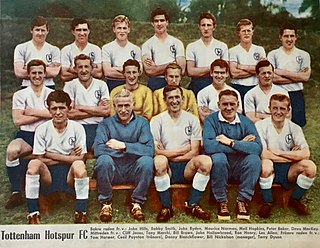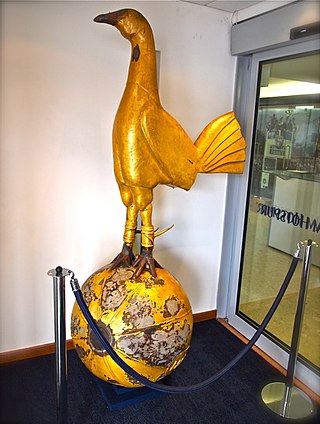Related Research Articles

Tottenham Hotspur Football Club, commonly referred to as Tottenham or Spurs, is a professional football club based in Tottenham, London, England. It competes in the Premier League, the top flight of English football. The team has played its home matches in the 62,850-capacity Tottenham Hotspur Stadium since April 2019, replacing their former home of White Hart Lane, which had been demolished to make way for the new stadium on the same site.

James Peter Greaves was an English professional footballer who played as a forward. Regarded as one of the greatest strikers of all time and one of England's best ever players, he is England's fifth-highest international goalscorer with 44 goals, which includes an English record of six hat-tricks, and is Tottenham Hotspur's all-time top goalscorer with 268 goals. Greaves is the highest goalscorer in the history of English top-flight football with 357 goals. He finished as the First Division's top scorer in six seasons, more times than any other player and came third in the 1963 Ballon d'Or rankings. He is also a member of the English Football Hall of Fame.

William Edward Nicholson was an English football player, coach, manager and scout who had a 55 year association with Tottenham Hotspur. He is considered one of the most important figures in the club's history, winning eight major trophies in his 16-year managerial spell, and most notably guiding the team to their Double-winning season of 1960–61.
Harry Keith Burkinshaw is an English former professional footballer and football manager. He is one of the most successful managers of Tottenham Hotspur, winning 3 major trophies for the club as manager there.
Arthur Sydney Rowe was an English footballer, and later manager, who played as a centre half. He was the first manager to lead Tottenham Hotspur to the First Division Championship title in 1951. He also "invented" the successful "one-two" method of play.

John Anderson White was a Scottish international football midfielder and sometime inside right who played a significant role for Tottenham Hotspur (Spurs) during their Double winning season in 1960–61. He had two brothers, Eddie and Tom, who were also professional footballers. White was killed by a lightning strike at the age of 27.
Push-and-run, also known as a wall pass, a one-two or a give-and-go, is a tactic and skill often used in association football. It involves quickly laying the ball off to a teammate and running past the marking tackler to collect the return pass. It proved an effective way to move the ball at pace, with players' positions and responsibility being fluid.

Robert Alfred Smith was an English footballer who played as a centre-forward for Chelsea, Tottenham Hotspur, Brighton and Hove Albion and England. He finished as the First Division's top scorer in the 1957–58 season and he is Tottenham Hotspur's third-highest goal scorer with 208 goals.
The Tottenham Hotspur Academy is the youth system of Tottenham Hotspur Football Club. The academy was created to train and develop players from the age of eight all the way through to the age of 23. Many of those who have progressed through Tottenham's academy have gone on to sign professional contracts and several have represented their country at full international level.

Edward Francis Baily was an England international footballer. He was a member of the 1950 FIFA World Cup squad, and scored five goals in nine international games. He was described as one of the best inside forwards of his generation.

John Cameron was a Scottish footballer and manager. He played as a forward for Queen's Park, Everton and Scotland and was noted as an effective goal-maker and goalscorer. In 1899 he became player-manager at Tottenham Hotspur and guided them to victory in the 1901 FA Cup. As a result, they became the only club outside the English Football League to win the competition. In 1898 he became the first secretary of the Association Footballers' Union, which was the ill-fated fore-runner of the Professional Footballers' Association. He later coached Dresdner SC and during the First World War he was interned at Ruhleben, a civilian detention camp in Germany. After the war he coached Ayr United for one season and then became a football journalist, author and publisher. He had previously worked as a columnist for various newspapers before the war.
William Arthur Ronald Burgess was a Wales international footballer, who played in the wing half position.
Peter McWilliam was a Scottish footballer who played at left-half for Inverness Thistle, Newcastle United and Scotland. He won every domestic trophy during his nine years with Newcastle United.
James Gillen Robertson is a Scottish former professional footballer who played as a winger. Robertson featured with clubs Cowdenbeath, St Mirren, Tottenham Hotspur, Arsenal, Ipswich Town, Stoke City, Seattle Sounders, Walsall and Crewe Alexandra.
John Brooks was an English professional footballer and manager who played for Reading, Tottenham Hotspur, Chelsea, Brentford, Crystal Palace in the Football League. Brooks won three England caps and scored two goals. Towards the end of his career he played in non-League football with Stevenage Town and Cambridge City and in North America with Cleveland Stokers. He later player-managed Knebworth. His son Shaun Brooks also had a career in professional football.
James Edward Neighbour was a professional footballer who played for Tottenham Hotspur, Norwich City, West Ham United and the Seattle Sounders.
Peter John Collins is a former professional footballer who played for Chelmsford City, and Tottenham Hotspur.

Tottenham Hotspur Football Club is a football club based in Tottenham, north London, England. Formed in 1882 as "Hotspur Football Club" by a group of schoolboys, it was renamed to "Tottenham Hotspur Football Club" in 1884, and is commonly referred to as "Tottenham" or "Spurs". Initially amateur, the club turned professional in 1895. Spurs won the FA Cup in 1901, becoming the first, and so far only non-League club to do so since the formation of the Football League. The club has won the FA Cup a further seven times, the Football League twice, the League Cup four times, the UEFA Cup twice and the UEFA Cup Winners' Cup in 1963, the first UEFA competition won by an English team. In 1960–61, Tottenham became the first team to complete The Double in the 20th century.

John Johnston Ryden was a Scottish professional footballer who played for Duntocher Hibernian, Alloa Athletic, Accrington Stanley, Tottenham Hotspur, Watford, Romford, Tunbridge Wells Rangers and Bexley Utd
References
- ↑ Goodwin, Bob (1 August 2003). Spurs: The Illustrated History. Breedon Books Publishing Co Ltd. p. 84. ISBN 978-1859833872.
- ↑ Jimmy Anderson football manager in Topspurs.com
- ↑ "TOPSPURS - the world-famous home of Tottenham Hotspur on the internet". topspurs.com.
- ↑ "The Double – 1960-61". Spurs for Life.